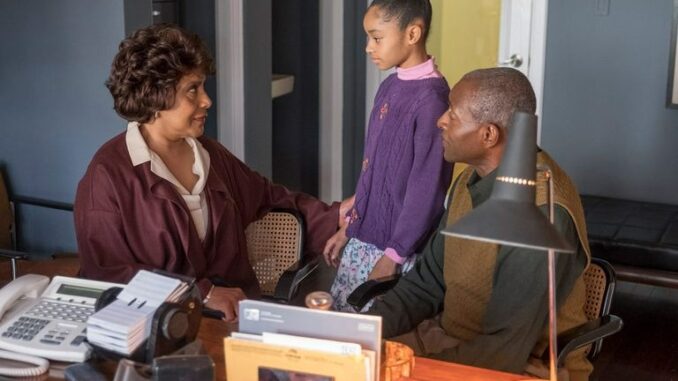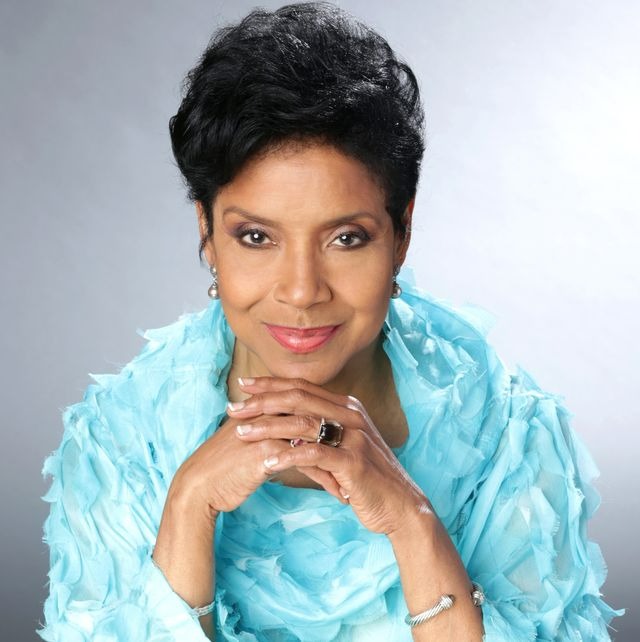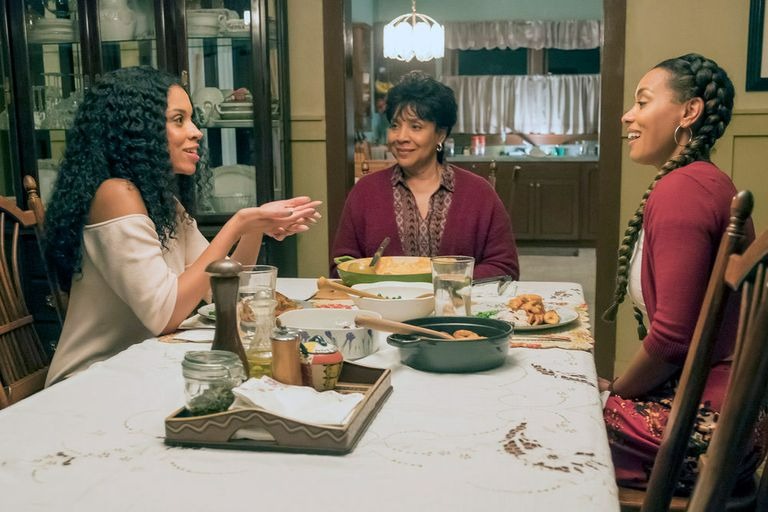
Phylicia Rashad Opens up About Portraying Iconic Black TV Moms
Fresh off a role on This is Us, the star says she’s “humbled” by her career.
For more than 30 years, Phylicia Rashad has brilliantly assumed the role of matriarchs in television, film, and on stage.
While the 70-year-old Houston native doesn’t profess to represent every mother, she’s certainly embodied a maternal figure for many in the Black community since her emergence as Clair Huxtable on The Cosby Show in 1984. And Rashad—who is a mother in real life to two children, Condola Rashad, 32, and William Lancelot Bowles III, 46—doesn’t reject the lofty title of being everyone’s favorite TV mom. In fact, she acknowledges to OprahMag.com that it’s “a humbling experience.”
In addition to representing the positive end of the Black familial spectrum, the Tony Award-winning actress continues to increase her appeal across generations. Mature fans still have a fondness for the warmth and humility she brought as a mother of five on The Cosby Show. Meanwhile, millennials were exposed to the grace and wisdom she exhibited in Creed (2015) and Creed II (2018) as Adonis Creed’s (Michael B. Jordan) adoptive mom, Mary Anne Creed. And on Fox’s Empire, she’s taken a manipulative and adversarial turn as Diana DuBois, head of the powerful DuBois family.
But it’s her most recent appearance as Carol, the stern mother to Beth Pearson (Susan Kelechi Watson) on season 3 of This Is Us, as well as her latest project voicing retired NBA player Kobe Bryant’s new book, The Wizenard Series: Training Camp, that are further bridging the gap between both older and younger generations’ appreciation for Rashad. Oh, and a certain recent cameo might’ve done the trick, too: Last year, rapper Drake featured her in his “In My Feelings” video, and for her recent When I Get Home album, Solange sampling Rashad reading her mother’s poem “On Status.”
Needless to say, the more Rashad evolves as an actress, the more she diversifies her fanbase. Yet she still remains deeply connected to her roots as a mother, teacher, and positive representation for Black woman—and soon, audiences will see her combine all three in OWN network’s upcoming drama, David Makes Man.
In an interview with OprahMag.com, Rashad discusses how she’s embracing the mother archetype—even in book form—as well as whether “The Big Three” fans will see more of her in season 4 of This Is Us.
In the second half of season 3 of This Is Us, Pearson fans finally got the chance to see some of Beth’s backstory in the “Our Little Island Girl” episode. What was it like working with Watson, whom you once taught at Howard University?
I was one of Susan’s instructors the semester I taught weekly method acting classes. She was one of the most extraordinary students in the class. We maintained a friendship and connection through the years, having worked together twice professionally in public theater, including on a production called A Raisin in the Sun. I directed the play, and she portrayed Ruth Younger. It was wonderful to engage with her as a fellow cast member. As I sat there looking at her, during that dinner scene on This Is Us, I just marveled at how beautiful and developed she is, and how proud her parents must be.
So, you have to tell us. Will you be returning for season 4?
Oh, I don’t know if I coming back [laughs]. It was a guest appearance, and I was very happy to have accepted it, partly because of my longstanding relationship with Susan.
Obviously your appearances gave viewers a sense of nostalgia for the Cosby days. In what way would you say “Mama C” is similar to and different from Clair Huxtable?
One show was a situation comedy with a strong element of realism, but This Is Us is family drama. So the approach is different, but the acting is the same. Regardless, as an actor, you’ve got to find your truth somewhere, whether it’s comedy, satire, farce, melodrama, drama, or horror. As mothers, we’re all alike in what we go through to give birth, even though it might not be the exact same experience. But it’s the same process. We’re different because of our own individual stories. Each of our stories informs our way of being, thinking, and behaving.
You’re set to star in the new drama OWN series David Makes Man. What was your experience like working alongside Oprah, Michael B. Jordan, and Moonlight’s co-writer Tarell Alvin McCraney?
Well, I worked with Michael on Creed and Tarell on the play, Head of Passes. I’ve been interviewed by Oprah twice, and have had the pleasure of attending some of the screenings she’s been a part of. However, this is my first time working with her on something where she’s the executive producer. The collaboration with the three of them has just been wonderful, particularly because David Makes Man is top of the line.
That’s true. David Makes Man is already receiving positive reviews. In what ways is the show unlike other TV series?
You have an acclaimed playwright at the helm(McCraney), so the writing and sensibilities are quite different. The literature in theater is unlike what you read for TV and film, but somehow Tarell has traversed the divide. Also, you’ve never seen these characters. They’re all complex. You may think you have an understanding of who they are the first time you’re introduced to them, but you don’t. The level of truth in David Makes Man is astounding, and the show itself is unapologetic. But there’s humor too. It’s not predictable at all. The titular character, David, is in the gifted program, but he has to go outside of his community to attend school. So he always has to put on a different demeanor.
What was it about playing the role of a teacher that appealed to you, especially after portraying these mother archetype for so long?
My character, Dr. Woods, isn’t just a teacher. She’s come through a certain time in a certain way, so the experience has informed her approach in how she sets goals for herself and for her students in the series. Dr. Woods reminds me of the teachers I knew throughout grade school and high school. She’s purposeful and really dedicated to delivering each student to his or her own self, because that’s what education is supposed to do. She doesn’t talk about it. She just does it. She’s looking at her class with respect for each student, and the story is focused on David and friends. She wants to see them through, especially David because she understands the economic, social, and political challenges he faces.
Did you lean on your own personal experience as an instructor and student for your performance in David Makes Man?
I grew up during the time of legal segregation, and I come from a family of teachers. I’m basically predisposed to the mindset of obtaining a higher education. I’ve always been taught by example that learning is never done. All of my teachers were African-Americans. There were several African-American schools and institutions within the city of Houston, Texas, so the scope was broad. I, personally, never felt like I had to be anything other than myself. There weren’t any subtle seeds of self-hatred being planted there. That’s not to say there weren’t problems or conditioning in those communities. But because of the way I was educated, I know Dr. Wood’s travels. I understand her. I know her. For me, being well-educated was never an exception to or diametrically opposed to being African-American.
Let’s switch gears to The Wizenard Series, a book which highlights five athletes whose lives are altered after attending a mandatory training camp. How did you come to narrate a book conceived by Kobe Bryant, who I read is a big fan of yours?
Well, I’m a big fan of his too. We were connected through my association with Kris Browers, the composer and musical director for Green Book. I met Kris when he was a student at Juilliard. One day Kris called to inform me that he was working on a book with Kobe that would be recorded, and he asked if I would do it. They sent the materials, and after looking at it, I was happy to do it.
You’ve narrated quite a few books, from Coretta Scott King’s My Life, My Love, My Legacy to Terry McMillan’s Who Asked You. What’s different about The Wizenard Series, besides the subject matter, of course?
This is my kind of book. Well, they all were, or else I wouldn’t have read them. But this was an exciting opportunity to reach young readers. Kobe is using basketball as a means for personal development and self-awareness. I love that. It’s actually what young people deserve.
The book targets young adults. Is there any positive message adults can walk away with after reading?
From an adult perspective, it’s truthful. Kobe has created this book with writer Wesley King. Having spent time with young basketball players and adolescents in training camps, he’s used that as inspiration to create these characters. Young people are dealing with a lot right now, and they don’t have a way to express or communicate the help they need. This book is an outlet and will give young readers and parents support.
